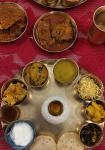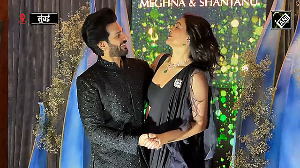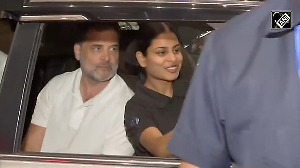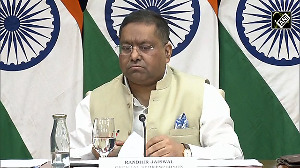There may not be many takers for Doordarshan and All India Radio in India, but they are in great demand among non-resident Indians.
Indian media owners and professionals abroad attending the 2nd Pravasi Bharatiya Divas in New Delhi expressed their desire to take content from DD and AIR to give a "feel-at-home" touch to their audience, who are mostly of Indian origin.
Doordarshan and AIR programmes will also help build a better image of India abroad, they felt.
The participants discussed contributions of the Indian ethnic media abroad at a roundtable discussion in a special session chaired by Minister of State for Information and Broadcasting Ravi Shankar Prasad at Vigya Bhawan.
R Chander, director of organisation for Hindu Media TV in the Netherlands, said: "There is great demand of programmes on Indian culture, history and philosophy. People want to know about India. This is where we think we can seek help from Doordarshan and AIR.
"We need quality programmes from India. If not the programmes, then at least the government should provide us good professionals in this field. This way both of us can benefit."
Indians who migrated aboard started and kept alive media organisations to voice their concerns, preserve their culture and identity, and bring the community together.
Though the huge Indian ethnic media is spread over 60 countries, the organisers of Pravasi Bharatiya Divas could manage to compile a list of about 100 print, radio, TV and online media organisations in 20 countries. These are owned, managed and run by Indians to cater to NRIs and PIOs.
Country like the Netherlands has a small population of PIOs who migrated long ago. Many times they are not well represented in the mainstream media and even portrayed negatively, said Chander.
"Every minority community in the Netherlands has its own media and the Dutch government has even subsidised ethnic media to promote it. So we are making lots of programmes focusing on Indian culture and philosophy. But we lack resources, infrastructure and manpower," he said.
"If Doordarshan provides us content on these issues, it would be wonderful."
He said his channel aired a series on Upanishad and Bhagwat Gita that became more popular among Dutch people than Indians.
"We are building India's image in our country. The (Indian) government should help us," he said.
Sumita Chakraborty-Broomes, senior producer of National Broadcasting Network Limited in Trinidad and Tobago, expressed similar views.
"We have one hour programme every Sunday on Rabindra Sangeet. People watch it even if they don't understand it. Music knows no barriers. Many Bollywood stars stage their shows in our country and these shows are doing so well. I am sure DD and AIR can share its content with us," she said.
Chander felt that the Indian government and ethnic media organisations abroad should jointly make programmes to target larger international audience and also the young "trans-national Indians."
H R Shah, CEO and chairman of US-based TV Asia, complained that Doordarshan in the recent years has started demanding more money for its programmes.
"Now Doordarshan is losing its market abroad because it is demanding more money. People are not ready to bid for it. Government should do something about it," he said.
"We are ready to buy DD and AIR programmes but is the government willing to do it?" he asked.
Imraan Vagar, CEO and chairman of Saira Essa Productions in South Africa, highlighted the role of ethnic media in the transition of democracy in the post-apartheid era. He explained how ethnic media has been able to counter the stereotyping of minority communities since the days when Mahatma Gandhi started Indian Opinion in 1903 in South Africa.
Dev Viswanath, vice president of US-based ITV, said his channel was showing many DD programmes and would love to share more such contents.
Many Indian channels like Zee, Sony, B4U were doing extremely well in the US and are popular even among Americans, he said.
All the speakers highlighted the role of ethnic media in bringing the Indian community together in foreign countries.
S Mitra Kalita, reporter with the Washington Post newspaper, said: "Carrying India Abroad gives a pan-Indian identity in the US." She also rejected the allegations that ethnic media insulated the migrant population from the mainstream.
Prasad said: "The government is planning to share the AIR content with ethnic media."
"We are also planning to create a platform to provide niche information on India's education, culture and economy to the ethnic media.'
Pawan Chopra, secretary, Ministry of Information and Broadcasting, said there were various institutions like Film Archive, Film Division, Publication Division etc where information are available.
"We are planning to digitalise the content in these institutions. After that everything would be available on the internet," he said.







 © 2025
© 2025